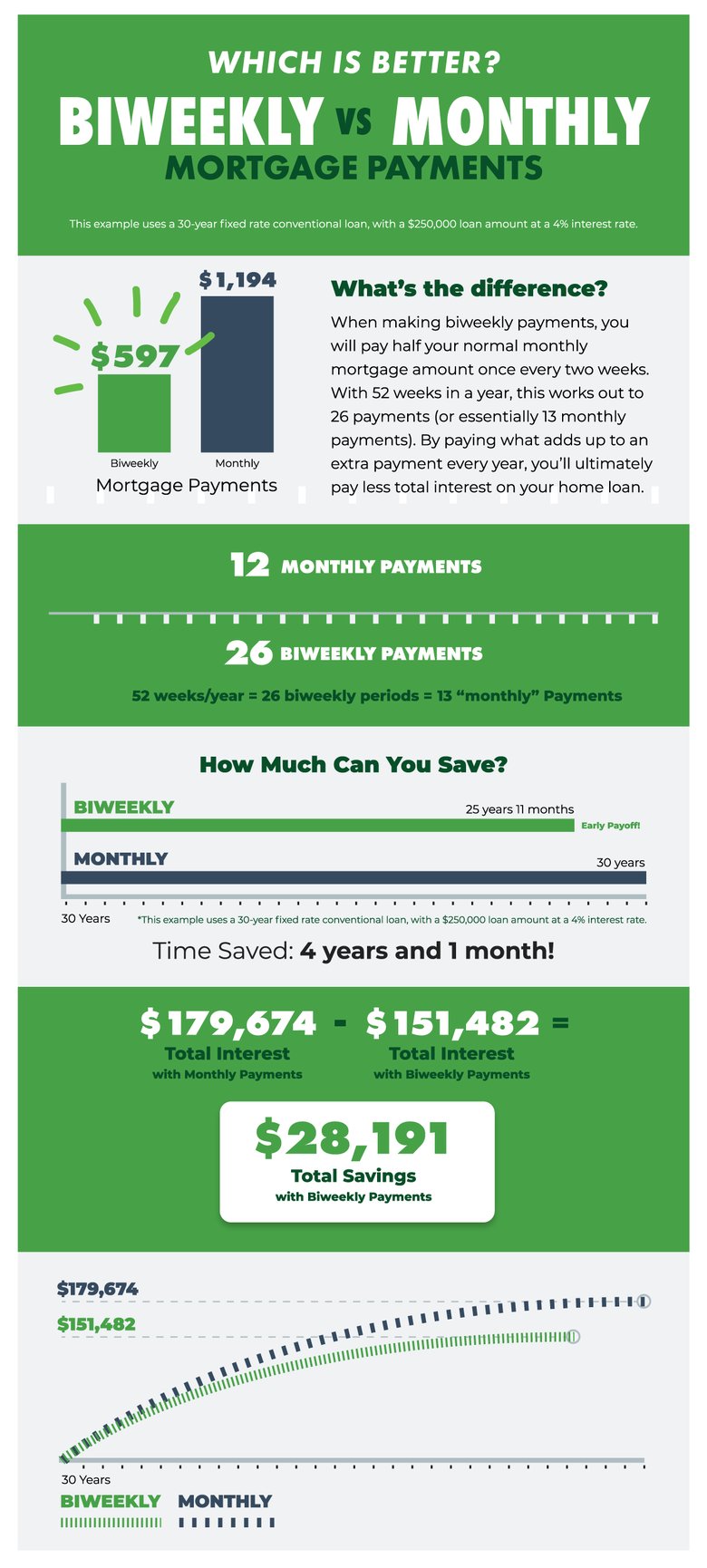Biweekly or Monthly Mortgage Payments: What's Better?
< Back to Articles | Time to Read: 5 minutes
If you pay your mortgage monthly (as most homeowners do), that equals 12 payments a year. So, if you start making biweekly payments, you will pay half your normal monthly mortgage amount once every two weeks. Since there are 52 weeks in a year, this works out to 26 payments (or essentially 13 monthly payments).
By paying 13 monthly payments over a 12-month time period, you’ll ultimately pay less total interest on your home loan and will lower your principal balance at a faster pace than if you just stuck with the traditional 12 payments a year.

Not all servicers offer biweekly payment programs.
The requirement for biweekly payments varies among servicers (i.e. where you make your loan payment to). And unfortunately, it is not an industry standard to offer a biweekly payment program, although it is very common with many servicers to make biweekly arrangements with their customers.
Important things to note:
- Be cautious of third-party vendors who will reach out to you separately and provide these extra services. You will often have companies offering to save you hundreds or thousands by handling your biweekly mortgage payments. Just be sure to use the services offered by the mortgage company (if provided). If they do not have the biweekly payment option, you can make an extra payment a year.
- Some servicers charge a fee to set up biweekly payments. The fees range based on the servicer but be sure to keep track of how much you will be charged.
- Some servicers just “hold on” to your biweekly payment for two weeks and wait for the second payment to just make one monthly payment on your behalf. Confirm with your mortgage company that this is not happening so you do not get charged any late fees.
If your current servicer has advised you they will not accept biweekly payments at this time, you always have the option to make an additional payment once per year since biweekly payments consist of 26 “half” payments which comes out to 13 payments per year. This can help for budgeting purposes and cost savings on your overall loan. Just remember, nothing is stopping your from making an extra payment on your own each year, if you choose!
Use our biweekly mortgage calculator to help you estimate your potential savings!
Pro tip: Confirm with your servicer that there are no pre-payment penalties for making an extra payment. This will save you some stress!
Advantages to making biweekly payments (or an extra payment throughout the year).
- Your home equity should build at a faster pace than if you just pay monthly (or make 12 payments in a year).
- The amount of interest you save on your overall home loan is a significant benefit, long-term.
- It can be easier to budget and will allow you to be able to pay off your mortgage sooner.
Disadvantages to making biweekly payments.
- If your servicer provides a biweekly payment program, know that it is a commitment to make a payment every two weeks. You cannot change this back and forth from month-to-month. Consider when you are paid by your employer (i.e. weekly, monthly, etc.) and plan accordingly.
- You will be paying more over the course of a year since you are adding on that extra 13th monthly payment. If your budget is already tight, this may not be the best option for you. It’s important to still have your emergency fund!
Biweekly vs. bimonthly mortgage payments
If biweekly is two payments a month, is that the same as a bimonthly payment? No, it is not! Which can make things a little confusing.
- Bimonthly: Requires two payments a month which comes out to 24 payments a year.
- Biweekly: This payment structure does not adhere to a monthly calendar since it is calculated on a biweekly basis, so it involves 26 payments a year.
The two extra payments for a biweekly mortgage payment plan is better than the bimonthly mortgage plan if your main goal is to save interest and pay off your home loan sooner.
If your loan is serviced by Churchill Servicing, click here to download the auto-draft payment enrollment form for the biweekly payment program.
*The values above are based on a $250,000 conventional 30-yr loan at 80% LTV with an interest rate of 4%, minimum credit score of 740, no mortgage insurance or discount points, and estimated closing costs of $10,000. The scenarios listed above have an APR of 4%. Additional fees are not included in the examples above. Programs, rates, terms, and conditions are subject to change without notice. All financing subject to credit, income and collateral approval. This is not a commitment to lend. Rates change daily. Other restrictions may apply.






